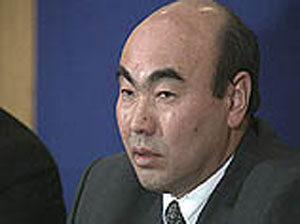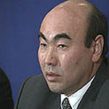
EXTENT OF AKAYEV REGIME CORRUPTION BECOMING CLEARER
Publication: Eurasia Daily Monitor Volume: 2 Issue: 81
By:

Representatives from Kyrgyzstan’s interim government and mass media are gradually revealing the content of former president Askar Akayev’s secret diaries, which were found after the capture of the Kyrgyz White House on March 24. The Kyrgyz public is finding out more about the degree of corruption undertaken by Akayev and members of his family during his 14 years ruling the country.
The Kyrgyz news agency Akipress (April 21) published an updated list of 42 enterprises controlled by Aidar Akayev and Adil Toigonbayev, the former president’s son and son-in-law, respectively. The list includes some of Kyrgyzstan’s most profitable businesses, such as Kumtor, Bitel GSM, cement factories, banks, gas stations, mass media outlets, restaurants, and more. Even the most modest estimates assert that the Akayev family illegally pocketed hundreds of million dollars every year.
It had been difficult to prove the extent of the Akayev regime’s corruption while it still controlled the country. Individual experts only guessed at the real numbers, and newspapers such as Res publica and Moya stolitsa novosti occasionally published journalistic accounts. Thus it is no wonder that one of the first steps undertaken by the new regime was the creation of a commission to investigate Akayev’s personal property and real estate assets for signs of corruption. The commission is comprised of parliamentarians, state employees, the state Ombudsman, bankers, NGO workers, and ordinary citizens. It is headed by Daniyar Usenov, a parliamentarian with a long record of anti-Akayev positions, whose large business went bankrupt several years ago, presumably due to adverse relations with the Akayev regime. Usenov says that the interim government is trying to satisfy the people’s demand to examine the Akayev family’s involvement in the national economy.
Before his resignation on April 4, one of the conditions Askar Akayev put before the parliament was a request to stop persecution of his family for past instances of corruption. But the Kyrgyz parliament refused to accept his terms. In response, daughter Bermet Akayeva complained to Azattyk radio (April 21) and Vecherny Bishkek (April 22) that any investigation of her family’s property would inevitably lack objectivity. She insisted that no member of her family is involved in economic activities, except for her husband whose business is mostly located in Kazakhstan. Almost simultaneously, Moya stolitsa novosti (April 22) issued a special report exposing her rigged campaign for a parliamentary seat. Unlike Bermet, her brother Aidar Akayev has not appeared in public since the February 27 elections, although he also won a parliamentary seat. Before his father was ousted, Aidar had regularly appeared in public places and was a familiar face among the residents of Bishkek and Issyk-Kul, especially with younger people.
Another shocking truth revealed in the course of regime change is the fact that the old government, including the security structures, organized mass pogroms and looting to interrupt peaceful demonstrations. Many experts and politicians, including acting foreign minister Roza Otunbayeva and NGO leader Edil Baisalov, believe these charges. According to them, on March 24 groups of aggressive provocateurs armed with stones and metal debris attacked demonstrators on the main square in Bishkek to provoke a fight. The government had hoped to end the protests with mass arrests after demonstrators and provocateurs clashed. According to Res publica, the “spontaneous demonstrators” arrived armed with stones collected from the outskirts of Bishkek and improvised metal bludgeons. It follows that Akayev’s government foresaw the March 24 protests in Bishkek, as anti-revolutionary actions were prepared in advance. However, the attack on the White House on the first day was not anticipated either by the opposition or the government.
Ordinary citizens are trying to understand what the revolution means to them personally and, more importantly, to decide how they will vote in the upcoming presidential election. There are some supporters of the previous regime, mostly in Bishkek, who feel nostalgia for the Akayev era, saying it was a stable existence, without lootings or spontaneous appropriations of land by peasants. Uncertainty about the future has become the main reason for the rapidly increasing exodus of ethnic Russians. Others say that the true revolution has not materialized yet, so far only a mere shuffle of political figures has taken place. The revolution, according to this view, will be evident when the government is no longer suspected of corruption and the economy begins to prosper.
High political standards and economic efficiency are a tall order for a new government. But it is yet unclear who will be next president in Kyrgyzstan. Felix Kulov is the most popular figure across the entire country, gaining over 50% in Internet polls. Yesterday (April 25) Kulov announced that he would enter the presidential race. Acting President Kurmanbek Bakiyev polls about 20%, but has formed a coalition government in the past month. According to Omurbek Tekebayev, the speaker of parliament, “On July 10 we are choosing not only a new person, but a new era of Kyrgyzstan.”




